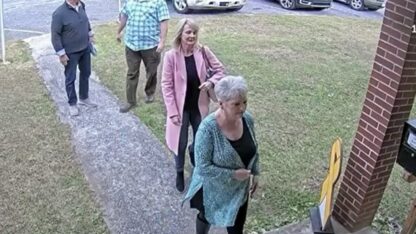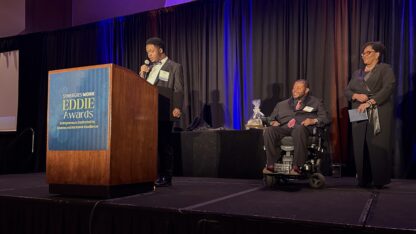On a sunny day in mid-August, a gold 1950s Chevy Bel Air rolls down Joseph E. Boone Boulevard on Atlanta’s west side.
As the classic car pulls in front of HN Liquor Store, nestled on a corner lot in the city’s Bankhead neighborhood, at first its driver goes relatively unnoticed. However, when a small crowd starts to gather, some fans ask to snap selfies. One onlooker says repeatedly, “The king is here.”
The “king” he is referring to is, of course, Clifford Joseph “Tip” Harris Jr.
“How y’all doing?” the 38-year-old Atlanta rapper asks. “What’s happening?”
It’s been nearly two decades since T.I. released his first album and emerged on the national scene. He has No. 1 hits, Grammy Awards, big-screen appearances and a host of other accolades to his name. He’s been lauded as the “the king of the South” and one of the godfathers of trap music. But before he was T.I., the rapper, actor, activist, father and urban developer, he was Tip Harris, a native son of Bankhead.
It’s a not-so-distant past that is never far from his mind. As he drives around the streets where he grew up, T.I. says he’s pleased with the progress that’s been made. But he’s also looking to the future.
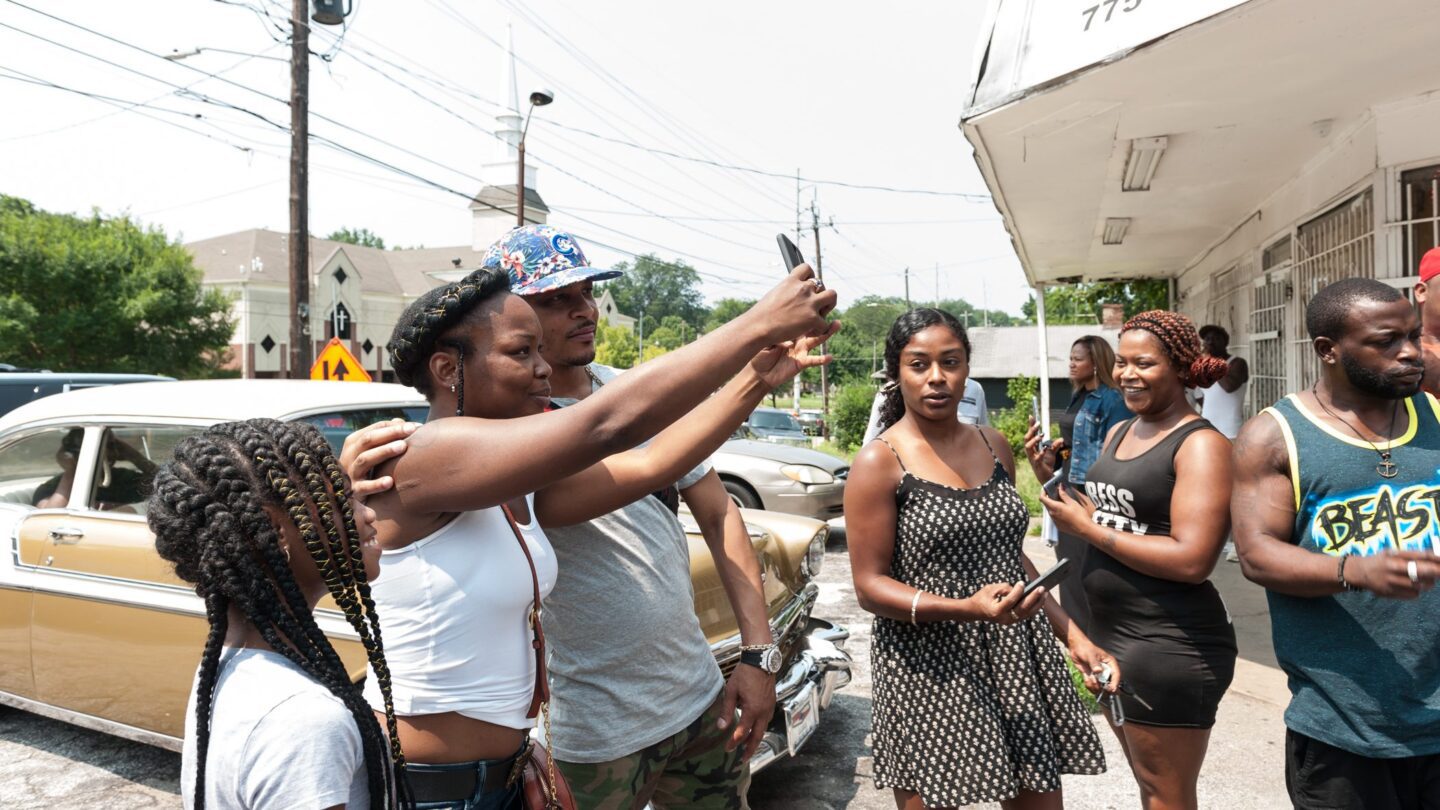
“We’ve come so far but have so far to go,” he says, arm extended over the Chevy’s oversized steering wheel.
Much like he’s transformed himself time and time again, he’s now focusing his efforts on transforming Bankhead and Center Hill. In 2017, T.I. founded Buy Back the Block, a venture to revive his childhood community. To date, he has invested more than $2 million in the area.
“What I’m doing right now, nobody in my family could have taught me how to do, that’s why I’m proud to say where I started from because the ending could have been catastrophically different,” he told WABE’s Rose Scott. “There’s beauty in that struggle.”
The properties T.I. has already purchased vary – in both what they were and what he hopes they will become. The liquor store on Boone Boulevard was one of the first properties he acquired. He plans for it to become a mixed-use development. But there’s also a former events center that will someday house a museum, a beloved community restaurant and the former Kmart site.
‘Humbling Beginnings’
He was born on Sept. 25, 1980, to Clifford “Buddy” Harris Sr. and Violeta Morgan. When he was coming of age in Bankhead, he went by the nicknames “Tip” and “Rubber Band Man.”
He has said Tip is a nod to his paternal great-grandfather and that “Rubber Band Man” came from when he was dealing drugs. The number of rubber bands worn by a dealer would show how much money and drugs they had, according to an MTV article.
He recalls growing up in a close-knit community where people looked out for one another.
“I thought we were rich until I was about 10, I didn’t know that other people lived differently. I never had any idea, I never saw anything other than my side of town. But I always had so much,” he said.
“My family was so well known in the community. They all went to the same high school and they’d been living there since the ’50s. I always thought that we were well off. It wasn’t until my uncle went to prison that I started noticing, ‘oh we’re poor.’”
“The first thing I remember our family having to round up money for was his attorney fees and that’s when I knew we weren’t as well off as I thought.”
His days dealing drugs as a teen are well documented and frequently cited. But T.I. said he doesn’t get sick of being asked about what he calls his “humble beginnings.”
The crack epidemic of the ‘80s and ‘90s hit communities across the country, including the west side neighborhoods situated off Bankhead Highway. For T.I., he said dealing drugs was the only option to help provide for his family.
“I think a lot of decisions and a lot of my choices they came from a lack of options. I didn’t want to necessarily sell drugs, but I mean, for a 15-year-old kid who’s trying … If you have a day to get up $500 otherwise the lights will be cut off, it’s not many other options in the community aside from crack at the time.”
ATL PBA presents “This is Where I’m From: The Transformation of T.I.”
By 1999, T.I. signed a record deal with Arista Records after years of selling mixtapes around the neighborhood with Big Kuntry King. Out of respect for fellow Arista artist Q-Tip, he shortened his name from Tip to T.I.
“Everybody who knows me calls me Tip,” he has said. “T.I. is the entertainer.”
From there, the teenager was well on his way to success. But even though his own success story is written, he’s quick to remember it could have gone a different way.
“If a person started out having all the answers and you started out knowing the way and doing it right from the beginning you’re supposed to be successful. … but if you started out on the wrong side of the tracks, doing it wrong, learning from trial and error, having to make adjustments and restructure yourself in society that is noteworthy.”
Now, T.I. says he can pay the lessons he learned the hard way forward, not only to his children, but to his community as well.
T.I. said the west side remains special to him, because it was there that people first believed in him. Now, he’s showing he believes in them, too.
However, the community isn’t immune to the rapid gentrification happening across Atlanta, which is where T.I. comes in.
“I hope to see the natives find a comfortable place and receive the longevity they deserve. We’ve endured some of the most excruciating times in this area, in this community. We survived some of the most treacherous days and nights, weeks, months and years in this community, so if there’s going to be any prosperity to come from this area, those of us who endured those times should reap the benefits first.”
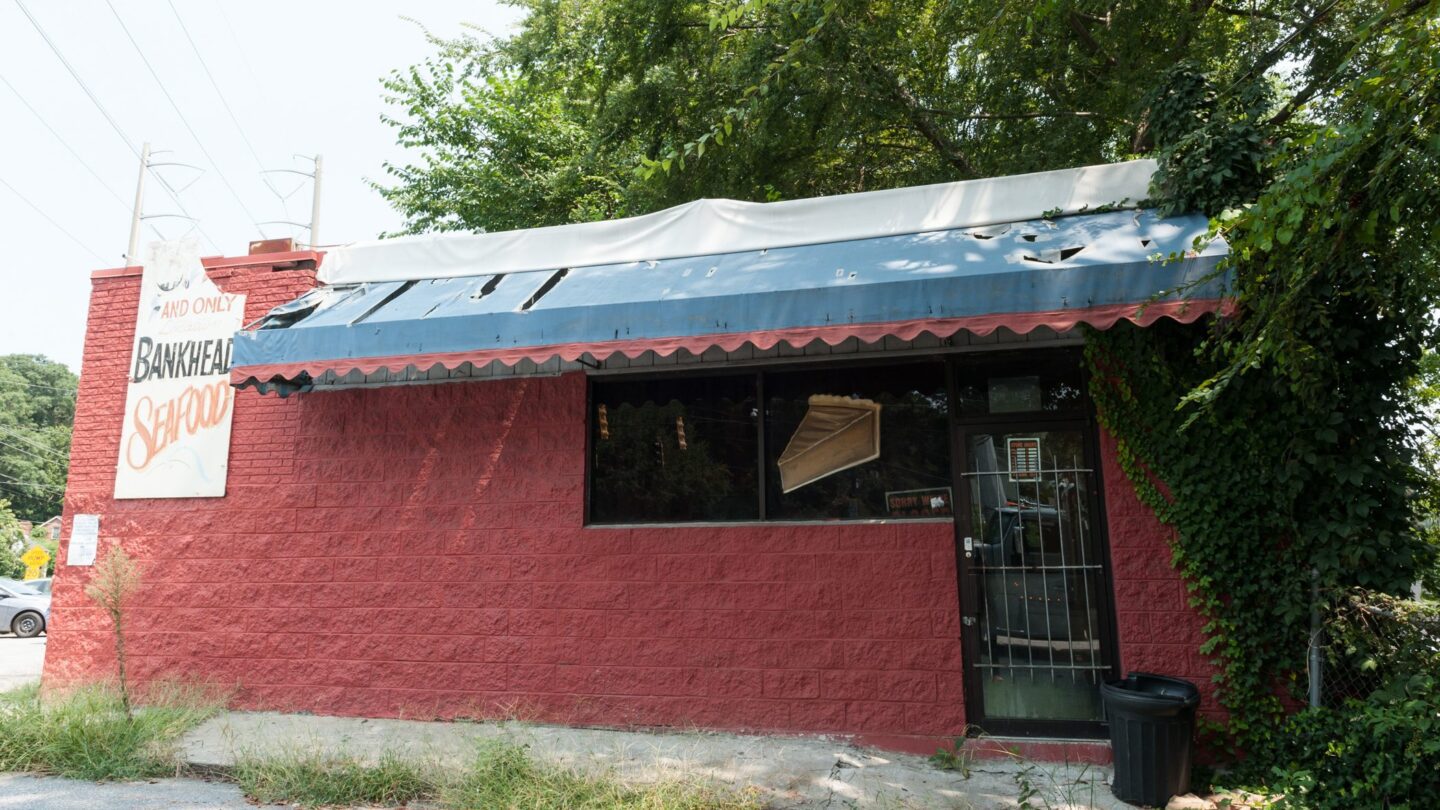
‘Sentimental Purchase’
From behind the wheel of his vintage whip, T.I. points out properties he’s acquired and others he hopes to, but he isn’t quick to reveal his strategy. Some, like the HN Liquor property, are strictly practical.
After the city announced plans to build the nearby Mercedes-Benz Stadium, T.I. said he purchased the package store and surrounding properties before the stadium drove prices up.
At the property along Boone Avenue – named for the late civil rights activist and organizer the Rev. Joseph E. Boone – T.I. has plans for a three- or four-story mixed-use development, with retail property on the ground level and apartments above, 30-40 percent of which he says will be affordable housing.
Other properties he has acquired have less to do with practicality and more to do with nostalgia. Like the red building with the blue awning perched at 1651 Donald Lee Hollowell Pkwy. NW.
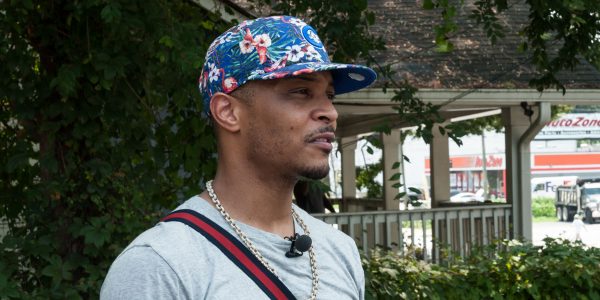
T.I. is quick to admit that “it doesn’t look like much now,” but for about five decades, Bankhead Seafood was a cornerstone of the community.
Helen Brown Harden owned and operated the business for almost 50 years before closing shop in January, citing her declining health and a lack of a succession plan to keep the family business afloat.
Harden told 11Alive News the decision to close her business was “like losing a child or a baby.”
“I mean, these customers were my life,” she said.
Customers like T.I., who said he went to Bankhead Seafood “more times than I can count.” He remembers people lining up out the door to order “the special” – a container full of fish, hush puppies and coleslaw.
His plan for the property is simple: “It’s going to be Bankhead Seafood.” Along with fellow Atlanta rapper, Killer Mike, T.I. bought both the building and the business. He calls it a “sentimental purchase.”
“This is a place where it was black-owned, operated … the family could bring $5 and feed three people.”
“I’m familiar with the establishment and I would hate for someone who has no familiarity to come along and acquire it and tear it down, demolish it and put a Starbucks here,” he said. “I mean, everybody loves coffee, but I wouldn’t trade Bankhead Seafood for a Starbucks.”
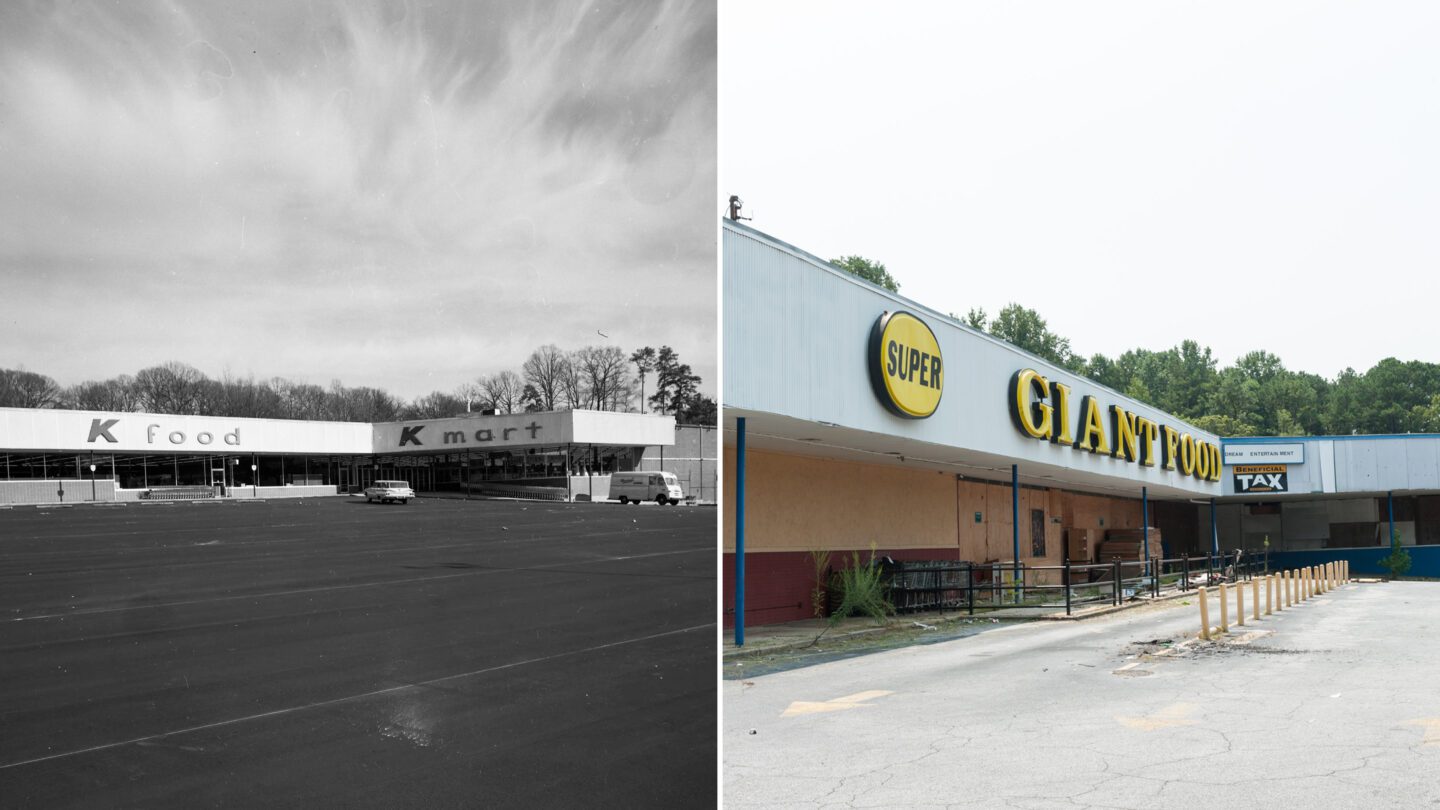
A mile away on Donald Lee Hollowell Parkway NW – once Bankhead Highway – sits an abandoned Kmart. For T.I., the 8.5-acre property mixes the practicality with the sentimental. It’s where his grandmother shopped for groceries and where he’d buy toys and trinkets as a kid, but now he’s hoping it can solve the community’s food desert dilemma.
“There is no fresh fruit, fresh vegetables, produce, like none of that is here right now. I hope to change that,” he said. “Of course, my research is telling me that the community will not sustain such an investment for about three to five years, but I’m looking to partner with some retail franchises and hopefully we can come together.”

For someone working so hard to transform an entire community, T.I. says he doesn’t concern himself with his own legacy.
He is, however, doing his part to document the story of trap music – a story he is undoubtedly a part of. At 630 Travis St., renovations are underway to convert a former event space and nightclub to what will eventually be a trap music museum.
“The trap is where you went to conduct your felonious activities. Trap music is just music that tells those stories,” he says while standing in the space. “More than anything this is to celebrate all of the contributors who had a hand in taking it from what it was to what it is today.”
The origin story of trap music is subject for debate. T.I. and fellow Atlanta rapper Gucci Mane have squabbled publicly over who first pioneered the popular musical style, but he says the museum will include everyone.
“Everybody will be celebrated here. I think it’s great for the kids of the guys and girls who still exist in those areas. To see that there is a brighter side.”

‘The Most Important Thing’
As he prepares to open the museum, T.I. is also thinking about his future as an artist. Since that first record deal in the late ‘90s, he has released nine studio albums, which include some of his biggest hits like “Bring Em Out,” “Whatever You Like” and “Live Your Life.”
Now, he says he’s nearing the end of his hit-making days.
“I have this one and maybe two more (albums),” he said. “I may make it to 12 and that’s just because I have the concept of what the albums will be and beyond that, I think it’s time to let someone else have it.”
In his recent work, T.I. has turned toward politics. In 2016, he released “Us or Else: Letter to the System,” which directly comments on police brutality and social justice issues.
It was an album, he said, he never intended on making. He said it just bled out of him.
“I just did that because of the things that were going on in society, whether it was Trump and his shenanigans, Ferguson, Philando Castile, Eric Garner. Everybody who died senselessly at the hands of authority to no accountability. All of those things, they compelled me, I felt obligated to speak on it.”
Despite addressing the political climate in his recent work, T.I. says he has no plans of seeking elected office in the future. But he has found other ways to use his celebrity status for change.
“I think I can be more helpful if I’m not encumbered by all the obligations of politics, I think I can use my platform to support politicians who are passionate about doing real work in the community and serving the underserved areas,” he said.

In January, Atlanta Mayor Keisha Lance Bottoms appointed T.I. to her mayoral transition team.
And he has used his platform to draw attention to efforts like Black Lives Matters. In July 2016, he and his son joined protesters in downtown Atlanta after officer-involved shootings killed Alton Sterling and Philando Castile in Louisiana and Minnesota, respectively.
He said that day was a catalyst for “Us or Else.”
“My son was like, ‘Pops, so what do we do?’ I had no idea, but I said we’re not going to sit by and do nothing. There was a rally going on down in Centennial Park so we just stopped and got in it, got in the mix.”
He calls fatherhood “the most important thing” he’s done with his life.
“All the things I went through, all of my misused days and nights in the trap, all those experiences are put to good use when I’m able to tell my sons not to do something because I know what the outcome will be. When I’m able to tell my daughter not to worry herself about the actions, decisions or activities of certain young men. I know from experience what these things lead to and I can kind of direct them accordingly. That means the world to me.”
As he weaves through the boulevards of Bankhead, he is at ease. He waves at fellow motorists and greets every person he passes. His roots here run deep. He is synonymous with Atlanta. The city’s streets tell his stories and for him, he says this will always be home.
“The reason this community is so special to me is, as much as people nationwide and worldwide think of me, this community thought that of me first.”
“From running the streets of Center Hill and Bankhead to running the halls of Grove Park and Douglass High, everyone kind of recognized my talent and ability early and supported that.”
“If I didn’t have the initial support from the community … ” For a brief moment, he seems to allow that idea to hang in the air. What would have come of him if he hadn’t had that support?
But he doesn’t linger for long. There is work to be done and a community to serve.
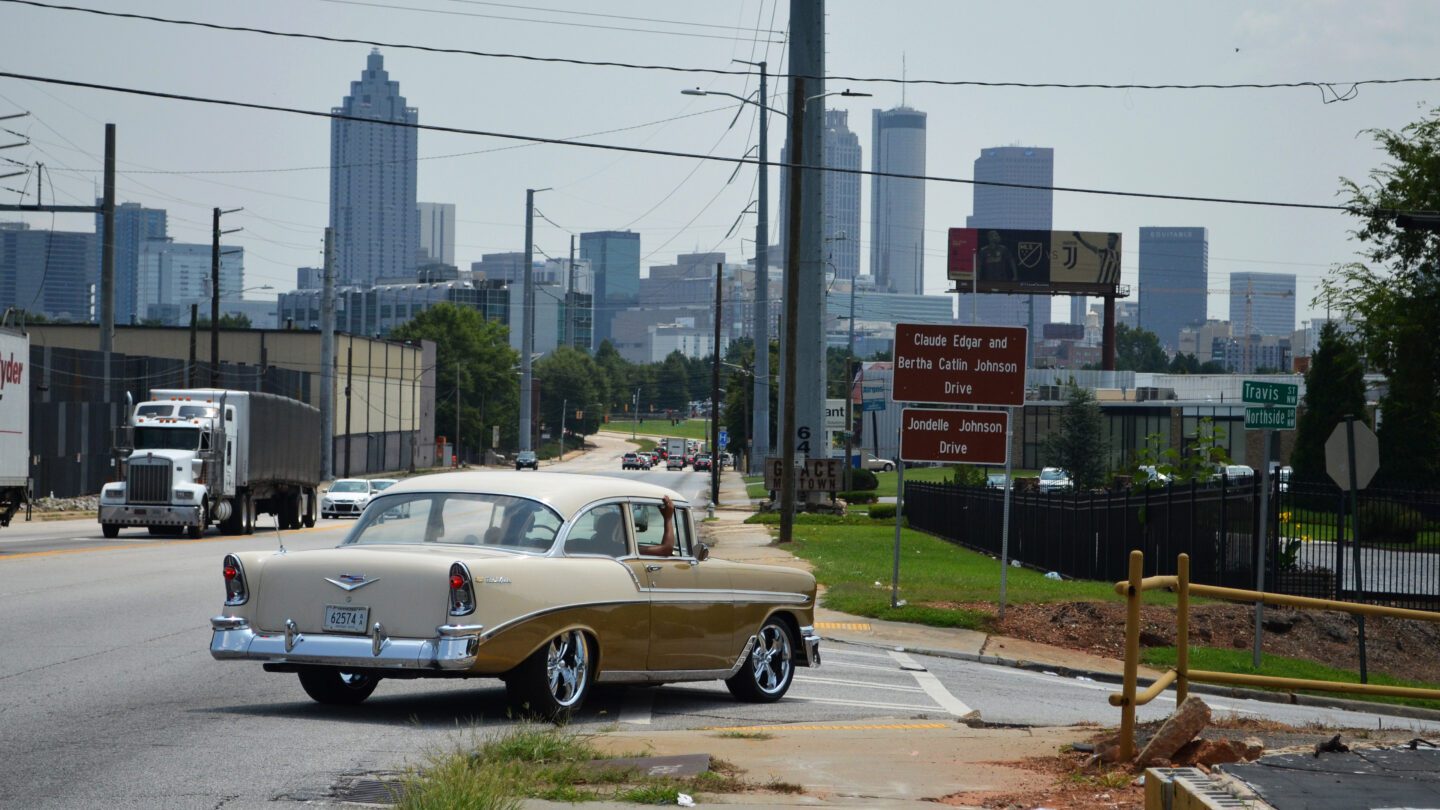
Editor’s Note: The quotes in this story came from an interview done by WABE’s “Closer Look” host Rose Scott. The on-air special was produced by Rose Scott with senior producer Candace Wheeler and producers Emilia Brock and Trevor Young. WABE’s Lauren Booker contributed to this web report.
Special thanks to: Catherine Alston; ATL PBA staff Jodi Tavoy, Gordon Ray, Perry Patterson, Brianna Williams and Rik Ludel; Atlanta Drone Group; the Barjon Group; The Brandshoppe; and Bryan Simons.




